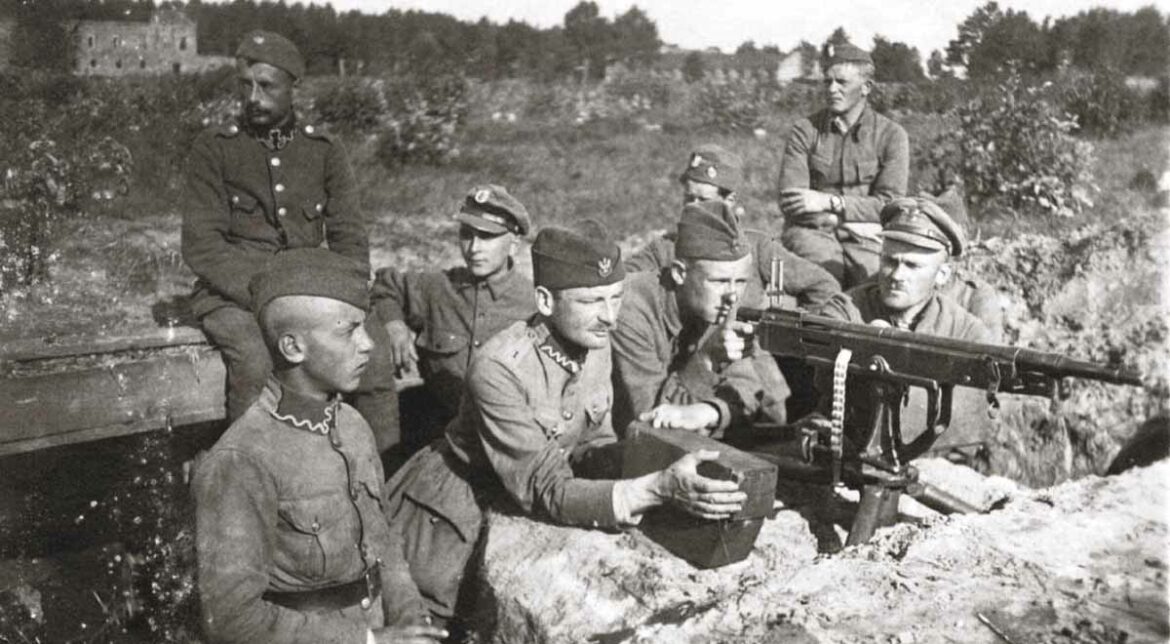In 1920 the Poles defeated the Bolsheviks in the Battle of Warsaw. They not only defended their independence, but also stopped the communists’ march deep into Europe. What was the 18th most important battle in world history like?
Poland regained its independence on 11 November 1918, after 123 years of occupation. In the east, the Russian Empire, hostile to Poland, had collapsed as a result of the revolution. The threat did not disappear, however, as the Tsar was replaced by the rule of communists – the Bolsheviks. They claimed Polish lands and furthermore assumed that communism would prevail in Europe instead of democracy.
The war between Poland and Bolshevik Russia broke out in February 1919. The Poles then succeeded in capturing Vilnius and Minsk, among other places. When the front stabilised, there were peace talks with the Bolsheviks, but they were in fact a smokescreen for the communists. During this time, Polish radio intelligence broke the Bolshevik army’s codes. This later proved crucial to the resolution of the conflict.
The Kyiv expedition
Thanks to the extraordinary work of Polish radio intelligence, Warsaw reached the information that the Bolsheviks were preparing a strike against Poland. The head of the Polish State, Józef Piłsudski, decided to prepare a pre-emptive attack. The Poles also made a pact with the Ukrainians led by Semen Petlura. It assumed that the Ukrainians would help the Poles in their fight against Bolshevik Russia, and Warsaw would recognise the existence of a Ukrainian state east of Poland’s borders. The two nations, with their joint forces, struck at the Bolsheviks, launching the Kyiv Expedition of 1920. This offensive led the Polish-Ukrainian army to take Kyiv, unfortunately not for long.
Poles rushed to defend independence
The Bolsheviks soon launched a counter-offensive. Their troops were advancing westwards and it appeared that they would soon threaten the capital of the recently revived Polish state.
The Poles began large-scale mobilisation. In July 1920, the Volunteer Army was formed under the command of General Józef Haller. The Government of National Defence headed by Prime Minister Wincenty Witos appealed for people to enlist. Over 100,000 volunteers were recruited. The Communists also tried their hand at enlisting Poles, but to little avail: a mere 200 volunteers were caught up in the clutches of Bolshevik propaganda.
Some doomed Poland to failure
Not everyone believed that the Poles would succeed in defending their independence. British Prime Minister David Lloyd George agreed with the Bolsheviks on the Polish issue, thus attempting to dispose of not his own territory. Also, transports of ammunition sent to Poland were blocked in the Czech Republic and Germany.
On the other hand, not everyone believed that Warsaw was doomed. Weapons sold to the Poles on credit were sent from France. The French also sent a military mission to Poland commanded by General Maxim Weygand and Marshal Ferdinand Foch. The group advised and trained the Poles. Among others, Charles de Gaulle was there.
Huge numbers of ammunition and weapons were also sent to Poland by the Hungarians. The operation was hampered by the fact that the Polish state did not border the country, and the direction of the transfer through the Czech Republic was blocked. The only option, therefore, was to send the cargo through Romania. This was successful, despite the Hungarian-Romanian conflict. Ammunition and weapons from Hungary arrived in Poland on 12 August 1920, at the last moment, on the very first day of the decisive clash.
The Poles were also aided by American aviators, who formed the 7th Tadeusz Kościuszko Fighter Squadron.
There was no lack of spiritual support either. The only country that did not evacuate its diplomatic representation from Warsaw was the Vatican. The papal representative Achille Ratti (later Pope Pius XI) remained in Poland, despite the immense danger.
The Bible versus the Bolsheviks
The first battles were fought over Radzymin, a town north of Warsaw. It passed from hand to hand until finally, after a counter-offensive by General Lucjan Żeligowski, the town was taken over by the Polish army. This enabled the strategy to continue.
Reliable Polish radio intelligence intercepted further information from the Bolsheviks. On 15 August, the Poles succeeded in intercepting the Bolshevik radio station, through which the staff maintained communication with the command centre. Polish radio operators learned the frequency on which the Bolsheviks were broadcasting and started jamming – for two days they broadcast excerpts from the Bible to the communists. As a result of this activity, part of the Bolshevik army did not receive up-to-date orders. It moved with the last order it received and ended up in Toruń – some 180 km from Warsaw, which was crucial for further developments.
Manoeuvre from the Wieprz River
On 16 August 1920. Józef Piłsudski launched a manoeuvre from the Wieprz River. The counter-attack was aimed at attacking the exposed left wing of the advancing Bolshevik army and breaking the line of troops. This manoeuvre carried a very high risk, but this was the option chosen by the Poles. The authors of this plan were Chief of General Staff General Tadeusz Rozwadowski, Colonel Tadeusz Piskor and Captain Bronislaw Regulski.
The risk paid off. After the attack, the line of the Bolshevik army was broken. The Poles began a tactical pursuit of the Red Army soldiers, who suffered heavy losses, amounting to 25,000 killed. In addition, the Poles took about 66,000 prisoners of war.
The 18th most important battle in the world
The Battle of Warsaw determined the survival of Poland’s independence. However, the victory of the Polish army on the outskirts of Warsaw also stopped the march of communism deep into Europe. In Poland, the battle was referred to as the “Miracle on the Vistula”. Edgar Vincent Viscount D’Abergnon – a politician and diplomat from Great Britain, who saw the Polish victory with his own eyes, described the Battle of Warsaw as the 18th most important battle in the world.





